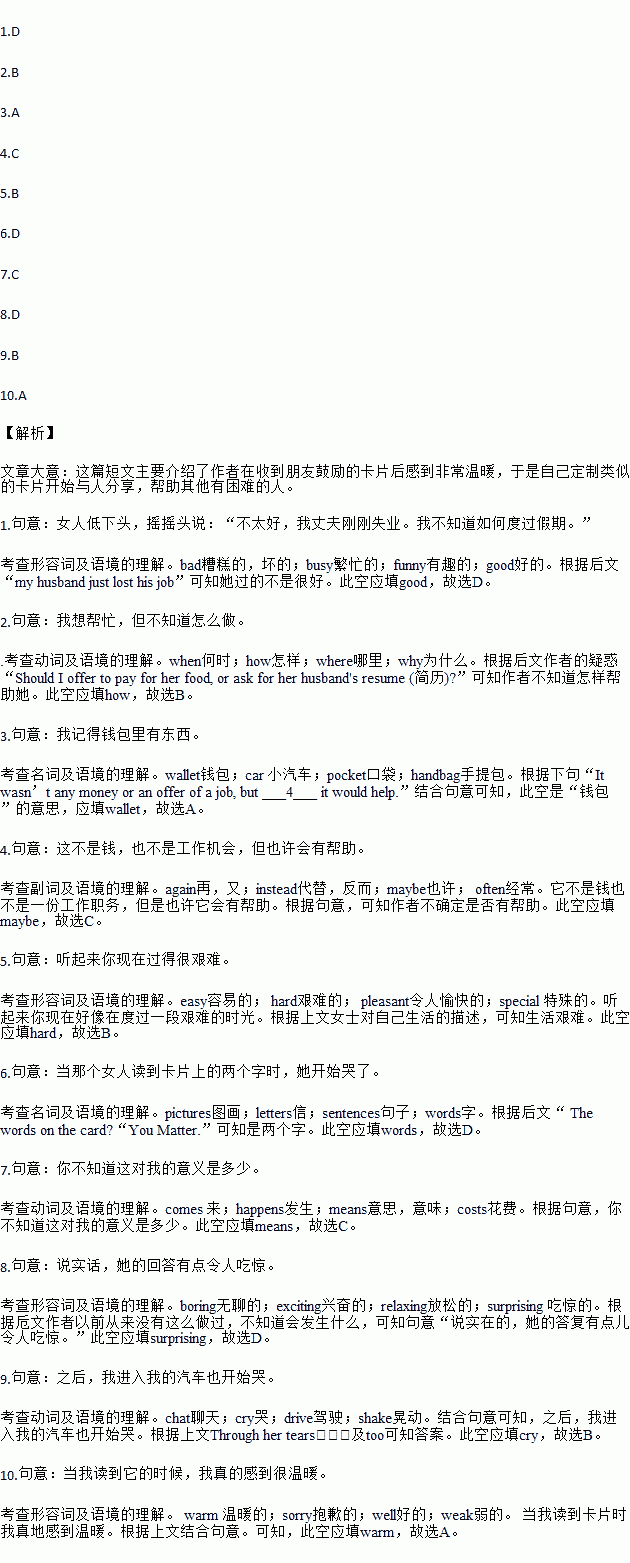题目内容
I was standing in line behind a woman in her 60s. When it was her turn to pay, the shop owner greeted her and asked how she was doing.
The woman looked down, shook her head and said, “Not so ________, my husband just lost his job. I don’t know how I can get through the holidays.”
Then she gave the shop owner the food stamps (食品券) for poor families.
My heart hurt. I wanted to help but didn’t know ______. Should I offer to pay for her food, or ask for her husband’s resume(简历)?
As I walked towards my car, I met the woman again. I remembered something in my ______. It wasn’t any money or an offer of a job, but ______ it would help.
“Excuse me,” I said. “I heard what you said to the shop owner. It sounds like you’re going through a really ______ time right now. I’m so sorry. I’d like to give you something.”
I handed her the small card from my wallet.
When the woman read the two ______ on the card, she began to cry. Through her tears, she said, “You have no idea how much this ______ to me.”
To tell the truth, her reply was a little ______. Having never done anything like this before, I didn’t know what could happen. All I could say was, “Would it be OK to give you a hug?”
After that, I walked into my car and began to ______ too.
The words on the card?
“You Matter.”
A few weeks earlier, a friend gave me a similar (相似的) card as encouragement for my work. When I read it, I really felt _____ . So I ordered my own box of You Matter cards and started sharing them.
1.A.bad B.busy C.funny D.good
2.A.when B.how C.where D.why
3.A.wallet B.car C.pocket D.handbag
4.A.again B.instead C.maybe D.often
5.A.easy B.hard C.pleasant D.special
6.A.pictures B.letters C.sentences D.words
7.A.comes B.happens C.means D.costs
8.A.boring B.exciting C.relaxing D.surprising
9.A.chat B.cry C.drive D.shake
10.A.warm B.sorry C.well D.weak
________do we need a swimming pool? Everyone in our family hates swimming!
A.Why B.What C.How D.Where
Claude Monet’s paintings were quite different from the art styles that were popular in the 1870s France. Traditional artists always did their artwork in a studio and their paintings looked exactly like the real world. Claude Monet was part of a group of painters who were called Impressionists (印象派画家). Their paintings gave an impression of what the real world looked like.
Knowing that trains were interesting subjects and stood for modern progress (进步), Claude Monet painted a series of Impressionist paintings of trains from January to March of 1877.
Monet’s friend, Pierre Auguste Renoir, told the following story to his sons about Claude Monet and painting the trains. Monet needed permission (允许) to stay on the train platform and paint what he saw in his impressionistic style. One day Monet dressed himself in his very best clothes. It seemed that he was a rich gentleman but in fact he really was a poor painter.
He showed the clerk (职员) at the train office his calling card which introduced him as Claude Monet, Painter. He asked to see the station master. The clerk quickly allowed this fine gentleman to enter the station master’s office. The station master gave Monet permission to paint on the train platform. He even stopped trains from leaving on time so Monet could complete a scene even though passengers complained.
Was it all worthwhile (值得)? Monet’s train scenes turned his career into a success and for the station master, made his train station famous until even now.
Claude Monet
Introduction | ◆Claude Monet was one of the Impressionist painters whose paintings were not the 1. as the popular art styles in the 1870s France. ◆Impressionist paintings gave an impression of 2. the real world looked. |
A story of painting | ◆At that time trains were subjects that could keep people’s 3. and represented modern progress. ◆He dressed himself as a wealthy gentleman to 4. the station master’s trust. ◆In order to help Monet complete a scene, the station master even made trains leave 5. than they should do. |
Result | ◆His train scenes made not only his career successful but also the train station famous. |
在一次班会课上,同学们热烈讨论学校的规章制度,认为有些规定学校需要做些修改。假设你是班长,总结同学的一些建议与理由,给学校领导发一封电子邮件。 注意:1. 邮件必须包括下面表格中的内容,并且增加两点建议与理由;词数 100 左右,开头已给出(不计次数)
advice | reasons |
leave school before 4:30 every Friday | very tired, have after-school classes |
read books in the library once a week | open our eyes, get a lot from reading |
… | … |
... | ... |
Dear leaders,
________________________________________________________________
I am the monitor from Class Nine Grade Three. My classmates and I have learned a lot and enjoyed ourselves in the past over two years. I think it will be better if we are allowed.

